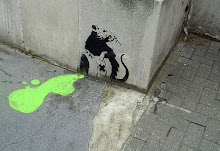04 May 2011
Meat Glue Used for Evil
I don't hide the fact that I'm a fan of molecular gastronomy. I like experimentation, that's why I'm all sciency. Plus I like food, hence the vegany. So when a friend showed me this article on The Dangers of Meat Glue and Processed Meat, I was pretty intrigued.
I've seen chefs make meat noodles and all sorts of strange things with transglutaminase (b.k.a. meat glue, though it really should be called protein glue), and I even had an idea to make reverse pasta where I make pasta out of tomatoes (and no flour) and then make a sauce from polenta or farina. It basically cross-links glutamine-containing protein strands to make one big protein blob.
The above article and video show that some companies and restaurants are using transglutaminase in disreputable ways. Or atleast alludes to it. I agree that selling chicken nuggets as prime cuts of meat is shady and possibly already illegal. However, I think the health risks may be overblown.
First, unlike with transfats there is no health risk from simply eating these 'glued' proteins. Humans have enzymes to break down these crosslinks, which occur naturally in many proteins we eat.
Although I do agree that the risks of contamination are multiplied, this risk is background to most meat eaters. Eating fishballs at an Asian restaurant, which is made with transglutaminase, does not show any large risk of disease. A more apt analogy for Western diets is ground beef, which is made form unglued bits of countless animals. We know it's made from low-quality meat, and it has shown a higher risk for contamination, but most people eat it anyways.
The real contamination risk is the meat itself, and the sum total of shady practices of which using meat glue to sell remnants is such a tiny fraction of the horrible and unhealthy things that happen. It's like shunning the late Osama bin Laden (or أسامة بن لادن) for picking his nose. Plus they have vegan fishballs that taste great to me.
One last note for vegan molecular gastronomers (and protein biochemists) who may have missed it in the viddie: Transglutaminase can come from bacterial sources, but can also be derived from swine and bovine blood as a slaughterhouse byproduct. So check with your manufacturer. Let me know if you hear anything about brands/products that are vegan and I'll post them.
Labels:
molecular gastronomy,
protein,
protein glue,
transglutaminase
Subscribe to:
Post Comments (Atom)






No comments:
Post a Comment
Be nice! Remember everyone is entitled to their opinion.